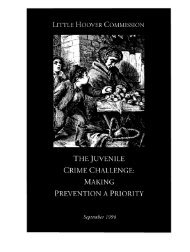Jailhouse Lawyer's Handbook - Sentencing and Justice Reform ...
Jailhouse Lawyer's Handbook - Sentencing and Justice Reform ...
Jailhouse Lawyer's Handbook - Sentencing and Justice Reform ...
Create successful ePaper yourself
Turn your PDF publications into a flip-book with our unique Google optimized e-Paper software.
United States “without regard to any differences of<br />
race, of color, or nationality.” Wong Wing v. United<br />
States, 163 U.S. 228 (1896); Plyler v. Doe, 457 U.S.<br />
202 (1982). This means that all persons within the<br />
territory of the United States are entitled to the<br />
protection guaranteed by the Fourteenth Amendment.<br />
In Chapter Two, Section C, Parts 3, 4, <strong>and</strong> 5 of this<br />
h<strong>and</strong>book, you learned that the Fourteenth<br />
Amendment protects your right to due process in<br />
disciplinary proceedings <strong>and</strong> administrative<br />
segregation, <strong>and</strong> your right to equal protection, which<br />
prohibits race, gender, <strong>and</strong> other forms of<br />
discrimination. Since non-citizens are also protected<br />
by the Fifth <strong>and</strong> Fourteenth Amendments, you can<br />
raise violations of due process <strong>and</strong> equal protection in<br />
the same ways that citizens can, through Section<br />
1983 actions.<br />
Non-citizens who are serving prison sentences are<br />
also protected by the Eighth Amendment right to be<br />
free from cruel <strong>and</strong> unusual punishment. As you<br />
learned in Chapter Two, Section C, Parts 7, 8 <strong>and</strong> 9,<br />
the Eighth Amendment protects you from guard<br />
brutality in prison, as well as guaranteeing you safe<br />
prison conditions <strong>and</strong> some level of medical care.<br />
B. POTENTIAL FOR DEPORTATION OR<br />
REMOVAL<br />
One of the most important things to be aware of as a noncitizen<br />
prisoner is that if you have been convicted of a<br />
certain kind of crime (as defined by the relevant statute,<br />
described below), you may be deportable after you have<br />
served your sentence. If you are determined to be<br />
deportable, you could be detained after you have finished<br />
serving your sentence <strong>and</strong> held for an uncertain period<br />
of time before you are deported from the country.<br />
Your rights in this area may depend on your<br />
immigration status at the time you were prosecuted,<br />
but both admitted <strong>and</strong> inadmissible non-citizens can<br />
still be removed for criminal convictions under<br />
certain circumstances. The category of crimes for<br />
which a convicted non-citizen may be removed<br />
differs depending on what law was in effect when<br />
your criminal proceeding began.<br />
There are currently three laws under which a noncitizen’s<br />
potential for removal can be evaluated.<br />
<br />
If your case began prior to 1996, it is governed<br />
by “old law.”<br />
<br />
<br />
If your case began between April 24, 1996 <strong>and</strong><br />
April 1, 1997, it is governed by the Anti-<br />
Terrorism <strong>and</strong> Effective Death Penalty Act of<br />
1996, often referred to as “AEDPA.”<br />
If your case was began after April 1, 1997, it is<br />
governed by the Illegal Immigration <strong>Reform</strong> <strong>and</strong><br />
Immigrant Responsibility Act, referred to as<br />
“IIRIRA.”<br />
These laws will almost certainly change in the<br />
future, so if you are researching this area, it is<br />
important to make sure you have the most up-to-date<br />
materials available. If you think that you might be<br />
deportable on criminal grounds, you may be able to<br />
challenge your deportation, so it is important to<br />
underst<strong>and</strong> this area fully <strong>and</strong> figure out which law<br />
applies to your case. You should try to contact an<br />
immigration attorney to learn more about your status<br />
<strong>and</strong> your rights.<br />
Appendix G: Protection of<br />
Prisoners Under International<br />
Law<br />
Along with the U.S. Constitution, your state<br />
Constitution, <strong>and</strong> federal <strong>and</strong> state laws, another<br />
potential source of protection for prisoners is<br />
international law. However, using international law<br />
in United States courts is very difficult <strong>and</strong><br />
controversial so you may not want to attempt it<br />
without a lawyer. This appendix will outline some<br />
basic facts about international law, <strong>and</strong> provide you<br />
with resources should you want to explore the area<br />
further.<br />
There are two main sources of international law:<br />
“customary international law” <strong>and</strong> treaties.<br />
Customary international law is unwritten law based<br />
on certain principles that are generally accepted<br />
worldwide. Treaties are written agreements between<br />
countries that set international legal st<strong>and</strong>ards.<br />
Customary <strong>and</strong> treaty-based international law are<br />
supposed to be enforceable in the United States, but<br />
sometimes it is difficult to get courts here to follow<br />
them.<br />
Customary international law prohibits several<br />
practices, such as slavery, state-sponsored murders<br />
<strong>and</strong> kidnappings, torture, arbitrary detention,<br />
systematic racial discrimination, <strong>and</strong> violation of<br />
generally accepted human rights st<strong>and</strong>ards.<br />
Restatement (Third) of Foreign Relations Law,<br />
JAILHOUSE LAWYERS HANDBOOK - APPENDIX<br />
86





